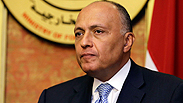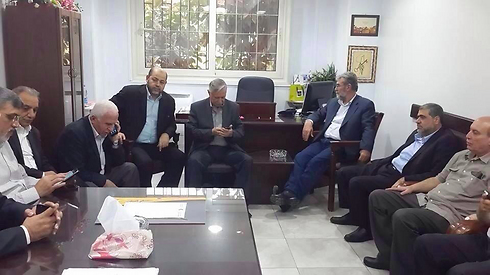
Israel agrees to extend current Gaza ceasefire; Hamas vows to renew fire
Report claims ceasefire extention deal reached, but Hamas denies calms; 'Two sides have reviewed what they consider as issues of concern,' Egyptian FM says as indirect Gaza talks begin.
Israel has reportedly agreed to extend the current ceasefire in Gaza Strip Wednesday as indirect Israel-Palestinian negotiations over extending a truce in Gaza got underway in Cairo.
However, Hamas was quick to deny the reports, saying it will renew fire at Israel as soon as the current lull has ended.
According to Reuters, Israel has conditionally agreed to extend a ceasefire that ended a month of fighting in Gaza beyond a Friday deadline, an Israeli official said on Wednesday, speaking on condition of anonymity.
Related stories:
- Israel, Hamas agree to Egyptian ceasefire initiative
- Netanyahu calls on Hamas to accept Egyptian ceasefire proposal
- UN urges Hamas to reaffirm ceasefire; Cairo talks postponed
The official did not say for how much longer Israel had agreed to extend the truce, only that: "Israel has expressed its readiness to extend the truce under its current terms," referring to the deal brokered by Egypt that took effect on Tuesday.
A senior Cairo-based Hamas official said late on Wednesday there was no agreement between the Israelis and Palestinians over the extension of a 72-hour Gaza ceasefire that took effect on Tuesday.
"There is no agreement on the extension of the truce," Moussa Abu Marzouk wrote on his Twitter feed.
Despite being a member of Hamas' political leadership, he is not part of the Islamist movement's inner circle but dealt directly with Egypt during talks it led to broker the ceasefire.
Hamas began a media blitz as soon as reports of an extended ceasefire began, with its spokesmen claiming that if their demands weren't met, especially the call to end the siege on Gaza, they would renew fire.
A source within the Izz ad-Din al-Qassam Brigades said that the brigades "will renew their aggressions as soon as the ceasefire ends Friday 8am."
Hussam Badran, the group's spokesperson abroad, said "Hamas did not give up on a single demand it presented in Cairo to the occupation (Israel)."
Another spokesperson for the group, Ismail Radwan, said "there is not extension to the calm. We have yet to receive a response to their demands."
Meanwhile, Al-Arabiya also reported that a deal to extend the current lull by an additional three days had been reached.
Israel wants the Islamic militant Hamas to disarm, or at least ensure it cannot re-arm, before considering the group's demand that the territory's borders be opened. Israel and Egypt imposed a closure after the Hamas takeover of Gaza in 2007, although Egypt allows individuals to cross intermittently.
"The two sides have reviewed what they consider as issues of concern," Egyptian Foreign Minister Sameh Shukri said at a news conference, describing the matter as "complicated and not easy."
While the Israeli leadership remained mum on ceasefire negotiations in Cairo, Palestinian officials were quoted in Arab newspapers on Wednesday saying Egypt has offered to extend the current ceasefire to 120 hours, and that the issue of the disarmament of Gaza is not on the table.
"The negotiations are hard. The Zionist enemy wants to claim achievements and doesn't want to admit its defeat," PFLP member Maher al-Taher said, calling Israel's demand to demilitarize Gaza "a dream."
"We've yet to receive an official response from Israel on the demands we presented to the Egyptians," Hamas political leadership member Izzat al-Rashq said.
Egyptian mediators have been shuttling between the delegations, and an Egyptian airport official said the Israeli delegation was back in Cairo Wednesday evening after flying out earlier in the day. He spoke on condition of anonymity because he was not authorized to brief reporters.
The Palestinian delegation is composed of negotiators from all major factions, including Hamas, and is meeting with Egypt's intelligence chief for briefings on Israel's demands.
"The most important thing to us is removing the blockade and start reconstructing Gaza," said Bassam Salhi, a Palestinian delegate. "There can be no deal without that."
He said the ceasefire, set to expire at 8 a.m. Friday (0500 GMT), would likely be extended if more time for talks is needed. Shukri said that he hopes it would be extended.
The negotiations are still in the early stages, but the outlines of a possible solution have emerged, including internationally funded reconstruction of Gaza overseen by a Palestinian unity government led by Palestinian President Mahmoud Abbas. The Western-backed Abbas lost control of Gaza in the Hamas takeover of 2007.
In a step toward reconstruction, Norway is organizing a donor conference, tentatively set for the beginning of September.
Regarding easing the blockade, a statement by Egyptian intelligence indicated it would not agree to major changes at the Rafah crossing between Egypt and Gaza, and the onus of lifting the border closure would fall on Israel.
Egypt considers Gaza occupied by Israel and the country responsible for Gaza's other heavily restricted border crossings that lead into the Jewish State. Cairo also refuses to open its border fully as long as Hamas, not the Palestinian authority led by Abbas, controls the Gaza side of the terminal.
"Israel is the one that sealed all the crossings from the Israeli side and it doesn't allow commodities and goods or individuals to cross, aiming at besieging the strip and throw the whole responsibility on Egypt," the statement said.
The statement also took aim at Hamas, saying it was not permitting its own wounded population to cross into Egypt.
"The Palestinian party continued to put obstacles in front of the families, allowing only its foreign members to cross while barring its Palestinian members under the pretext that Egypt is barring them," it said.
Rafah is closed to commercial traffic and allows only individuals to cross, but Egypt has sharply restricted travel rights of Gaza residents over the past year and waiting lists have grown.
Speaking at his news conference, held with his Venezuelan counterpart, Shukri said talks are giving priority to the Israeli-controlled crossings and how to operate them to "meet demands of the Palestinian people."
The ceasefire, in its second day, is the longest lull in a war that has killed nearly 1,900 Palestinians - 75 percent of them civilians according to the United Nations. Israel has lost 67 people, including three civilians.
The current round of confrontations began with the June 12 abduction-killing of three Israeli teens in the West Bank, which Israel blamed on Hamas before launching a roundup of hundreds of its activists, a move followed by barrages of Gaza rocket fire on Israel.
Israel launched airstrikes on July 8 it said were aimed at stopping the rocket fire before expanding the operation on July 17 by sending in ground forces to destroy a network of tunnels used to stage attacks.
On Wednesday, Israel's Justice Ministry said it had arrested Hussam al-Qawasmi, the suspected mastermind behind the killing of the Israeli teens, in July.
He allegedly led a three-man cell, all of whom were affiliated with Hamas. The militant group has not claimed any connection to the teens' abduction and killings.
In Gaza, people took advantage on Wednesday of the calm to return to their devastated homes and inspect the damage.
People trickled back to their homes making their way over buckled roads, through dangling power lines and overturned trees to inspect their neighborhoods. Along the way, rows of flattened buildings alternated with moderately damaged structures - and rare buildings with no damage.
Cars and donkey carts loaded with household goods and mattresses filled the streets and queues formed at banks as people waited to withdraw cash from ATMs.
Crews from utility companies worked frantically to repair downed electricity and telephone lines. Gaza's only power plant was shut down after it was badly damaged by an Israeli attack and repairs are expected to take months.
The densely populated strip now only has 2-3 hours of electricity a day which trickles in from Egypt and Israel.
Reuters, The Associated Press and Elior Levy contributed to this report











